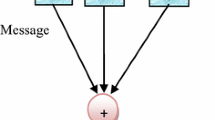Abstract
In this paper, we analyze the performance of multicast orthogonal frequency division multiplexing (OFDM) systems with single and multiple transmit antennas. We show that the resource allocation that includes the subcarrier allocation, bit loading, and the precoding vector selection in the multiple-input single-output (MISO) case is a difficult optimization problem. Consequently, we propose suboptimal algorithms based on the maximization of the sum data rate and the maximization of the minimum user data rate criteria. For practical application, we consider a complete transmission chain by combining powerful erasure codes with the proposed algorithms. Using this scheme, we guarantee that each user receives the same amount of information to decode the same data. Simulation results show that, for both single-input single-output (SISO)–OFDM and MISO–OFDM cases, the proposed multicast OFDM systems achieve gains over the worst user case algorithm.







Similar content being viewed by others
References
Varshney U (2002) Multicast over wireless networks. Commun ACM 45:31–37 (December)
Cimini L (1985) Analysis and simulation of a digital mobile channel using orthogonal frequency multiplexing. IEEE Trans Commun 33:665–675
Foschini GJ, Gans MJ (1998) On the limits of wireless communications in fading environment when using multiple antennas. Wirel Pers Commun 6:311–335
Bolcskei H, Gesbert D, Paulraj AJ (2000) On the capacity of OFDM-based multi-antenna systems. Proc IEEE Int Conf Acoust Speech Signal Proc 5:2569–2572
Wong CY, Cheng RS, Ben Letaief K, Murch RD (1999) Multiuser OFDM with adaptive subcarrier bit and power allocation. IEEE J Sel Areas Commun 17:1747–1758 (October)
Shen Z, Andrews JG, Evans BL (2003) Optimal power allocation in multiuser OFDM systems. In: Proc of IEEE Globecom conference. IEEE, Piscataway, pp 337–341 (December)
Suh C, Hwang CS (2004) Dynamic subchannel and bit allocation for multicast OFDM Systems. In: Proc of IEEE PIMRC, Barcelona, September 2004
Özbek B, Le Ruyet D, Khiari H (2006) Adaptive resource allocation for multicast OFDM systems with multiple transmit antennas. In: Proc of the IEEE ICC. Istanbul, June 2006
Le Ruyet D, Özbek B, Khiari H (2007) Performance of multicast MISO–OFDM systems. In: Proc of 13th European wireless conference, Paris, April 2007
Luby M (2002) LT codes. In: Proc of 43rd annual IEEE symposium on foundations of computer science (FOCS), Vancouver, 16–19 November 2002
Byers JW, Luby M, Mitzenmacher M (2002) A digital fountain approach to asynchronous reliable multicast. IEEE J Sel Areas Commun 20:1528–1540 (October)
Shokrollahi A (2006) Raptor codes. IEEE Trans Inf Theory 52:2551–2567
Proakis JG (1995) Digital communication, 3rd edn. McGraw Hill, New York
Sidiropoulos ND, Davidson TN, Luo ZQ (2006) Transmit beamforming for physical layer multicasting. IEEE Trans Signal Proc 54:2239–2251 (June)
Khun-Jush J, Schramm P, Wachsmann U, Wenger F (1999) Structure and performance of the hiperlan/2 physical layer. In: Proc of the IEEE VTC, vol 5. IEEE, Amsterdam, pp 2667–2671 (June)
ETSI Normalization Committee (1998) Channel models for hiperlan/2 in different indoor scenarios. ETSI, Sophia-Antipolis
Xiao Y (2005) Energy saving mechnism in the IEEE 802.16e wireless MAN. IEEE Commun Lett 09:595–597 (July)
Author information
Authors and Affiliations
Corresponding author
Additional information
The work of Berna Özbek was supported by the FP6-IYTE wireless project.
The work of Didier Le Ruyet and Hajer Khanfir was supported by the Euripides European project SMART.
Rights and permissions
About this article
Cite this article
Özbek, B., Le Ruyet, D. & Khanfir, H. Performance evaluation of multicast MISO–OFDM systems. Ann. Telecommun. 63, 295–305 (2008). https://doi.org/10.1007/s12243-008-0027-4
Received:
Accepted:
Published:
Issue Date:
DOI: https://doi.org/10.1007/s12243-008-0027-4




